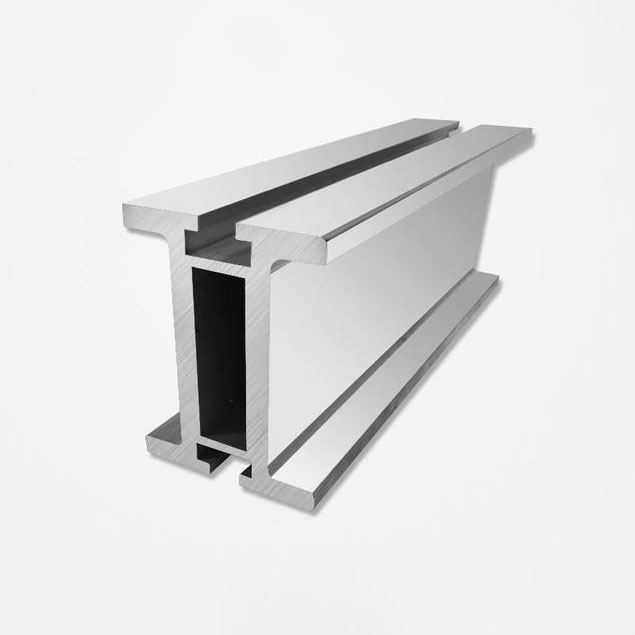Aluminum profiles have become an essential component in the railway industry, offering lightweight, durable, and corrosion-resistant solutions for various applications. From high-speed train body panels to structural frameworks, the right aluminum profile can significantly enhance the performance and longevity of railway systems. But how do you choose the ideal railway aluminum profile for your needs?

Railway aluminum profiles are extruded sections specifically designed to meet the unique requirements of the railway industry. These profiles are used in a wide range of applications, including:
- Train car exteriors and interiors
- Structural components such as beams and brackets
- Electrical enclosures
- Doors, windows, and flooring systems
Manufactured using high-quality aluminum alloys, these profiles offer exceptional strength, lightweight properties, and resistance to environmental factors, making them ideal for railway use.
Selecting the right aluminum profile involves evaluating several critical factors to ensure the profile meets the functional, safety, and operational requirements of railway systems.
1. Application-Specific Requirements
The intended use of the aluminum profile is one of the most important factors to consider. Different applications demand varying levels of strength, flexibility, and design precision. For example:
- Exterior Components: Profiles for train exteriors should be lightweight yet robust to withstand high speeds and environmental exposure.
- Interior Components: Profiles used inside the train should focus on aesthetics, functionality, and passenger safety.
- Structural Components: These require high tensile strength and durability to support the train’s framework.
2. Material Selection
Aluminum profiles are typically made from specific alloys tailored to the railway industry. Commonly used alloys include:
- 6061 and 6082: Known for their excellent corrosion resistance and structural strength, these alloys are suitable for load-bearing applications.
- 6063: This alloy is ideal for applications requiring precise shapes and superior surface finishes.
- 7005 and 7075: These high-strength alloys are used in applications where weight reduction is critical without compromising strength.
The choice of alloy should align with the operational requirements, such as stress tolerance, temperature variations, and exposure to corrosive environments.
3. Weight Considerations
One of aluminum's primary advantages is its lightweight nature, which is critical in the railway industry. Lightweight profiles reduce the overall weight of train cars, leading to:
- Increased energy efficiency
- Enhanced speed and performance
- Lower operational costs
When selecting a profile, ensure it offers the right balance of weight and strength for its intended use.
4. Customization and Design Flexibility
Railway applications often require custom-designed profiles to meet specific dimensions, shapes, and functional needs. Look for manufacturers who offer:
- Advanced extrusion capabilities
- CNC machining and precision cutting
- Surface treatment options such as anodizing or powder coating for added durability and aesthetics
Customization ensures the profile perfectly aligns with the design and engineering requirements of your railway project.
5. Durability and Corrosion Resistance
Railway systems are exposed to harsh environmental conditions, including extreme temperatures, moisture, and chemicals. The aluminum profile you choose must withstand these challenges without compromising its integrity. Features to look for include:
- High corrosion resistance
- Resistance to wear and tear
- Compatibility with protective coatings or treatments
6. Safety Standards and Compliance
Safety is paramount in the railway industry. Ensure the aluminum profile complies with industry standards and certifications, such as:
- ISO 9001 for quality management
- EN 15085 for railway applications
- Relevant fire safety and crashworthiness standards
Choosing the right railway aluminum profile requires careful consideration of factors like application requirements, material selection, weight, customization, and compliance with safety standards. By evaluating these aspects and partnering with a reliable supplier, you can ensure that the profiles meet the exacting demands of railway systems while delivering superior performance and efficiency.
Yingtai Aluminum, formerly Zhangzhou Antai Aluminum Co., Ltd. (established in 2006), was renamed Antai Technology Co., Ltd. due to the business development. To support the group listing, Yingtai Aluminum was separated from Antai Group in 2023. The company focuses on the R&D of high performance aluminum alloy material, and the manufacturing of various aluminum profiles, such as industrial aluminum extrusions, architectural aluminium extrusions, home decoration aluminum profiles, and lightweight aluminium profiles. Explore our full range of products on our website at https://www.yt-aluminum.com/. For any inquiries, please reach out to us at Sales@yt-aluminum.com.